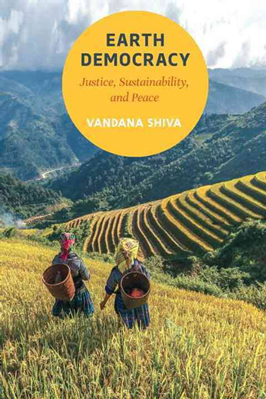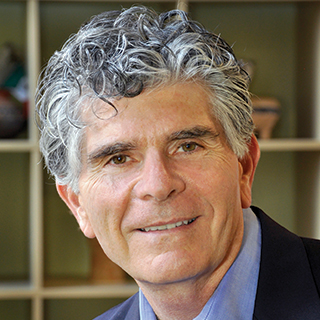One of the world’s most renowned environmentalists, Dr. Vandana Shiva trained as a Physicist at the University of Punjab, and completed her Ph.D. on the ‘Hidden Variables and Non-locality in Quantum Theory’ from the University of Western Ontario, Canada. She later shifted to inter-disciplinary research in science, technology and environmental policy, which she carried out at the Indian Institute of Science and the Indian Institute of Management in Bangalore, India.
In 1982, she founded an independent institute – the Research Foundation for Science, Technology and Ecology in Dehra Dun – dedicated to high quality and independent research to address the most significant ecological and social issues of our times, working in close partnership with local communities and social movements. In 1991 she founded Navdanya, a national movement to protect the diversity and integrity of living resources – especially native seed – and to promote organic farming and fair trade. For last two decades, Navdanya has worked with local communities and organizations, serving more than 500,000 men and women farmers. Navdanya’s efforts have resulted in the conservation of more than 3000 rice varieties from across India, and the organisation has established 60 seed banks in 16 states across the country. In 2004, Dr. Shiva started Bija Vidyapeeth, an international college for sustainable living in Doon Valley in collaboration with Schumacher College, U.K.
Dr. Shiva combines sharp intellectual inquiry with courageous activism, and her work spans teaching at universities worldwide to working with peasants in rural India. Time Magazine identified Dr. Shiva as an environmental ‘hero’ in 2003, and Asia Week has called her one of the five most powerful communicators in Asia. In November 2010, Forbes Magazine identified Dr. Shiva as one of the Seven Most Powerful Women on the Globe. Among her many awards:
- the Alternative Nobel Prize (Right Livelihood Award, 1993)
- Order of the Golden Ark (1993)
- Global 500 Roll of Honour, UNEP (1993)
- Earth Day International Award (1993)
- Lennon ONO Grant for Peace Award by Yoko Ono (2009)
- Sydney Peace Prize (2010)
- Doshi Bridgebuilder Award (2011)
- Calgary Peace Prize (2011)
- Thomas Merton Award in (2011)
- The Fukuoka Award (2012)
- The Prism of Reason Award (2012)
Dr. Shiva has contributed in fundamental ways to changing the practice and paradigms of agriculture and food. Her books The Violence of the Green Revolution and Monocultures of the Mindpose essential challenges to the dominant paradigm of non-sustainable, industrial agriculture. Through her books Biopiracy, Stolen Harvestand Water Wars, Dr. Shiva has made visible the social, economic and ecological costs of corporate-led globalisation. Dr. Shiva chairs the Commission on the Future of Food set up by the Region of Tuscany in Italy, she is a Board member of the International Forum on Globalisation (IGF), and a member of the Steering Committee of the Indian People’s Campaign Against the WTO.
Dr. Shiva has made significant contributions to the areas of Intellectual Property Rights (IPRs) and biodiversity. Through her leadership and commitments, Dr. Shiva and her team at the Research Foundation for Science, Technology and Ecology successfully challenged the biopiracy of Neem, Basmati and Wheat. Besides her activism, she has also served on expert groups of the government on Biodiversity and IPR legislation.
Dr. Shiva has campaigned internationally on issues surrounding biotechnology and genetic engineering. She has helped movements in Africa, Asia, Latin America, Ireland, Switzerland and Austria with their campaigns against genetic engineering. In 2003, when the US initiated a dispute against the EU to remove the bans and moratoria on genetically modified crops and foods, Dr. Shiva launched a global citizens campaign on GMOs in the WTO.
Dr. Shiva’s contributions to gender issues are nationally and internationally recognised. Her book Staying Alive dramatically shifts popular perceptions of Third World women. She founded the gender unit at the International Centre for Mountain Development (ICIMOD) in Kathmandu, and was a founding Board Member of the Women Environment and Development Organization (WEDO). Dr. Shiva has also initiated Diverse Women for Diversity, an international movement of women working for food and agriculture. The movement was launched formally in Bratislava, Slovakia, in May 1998.
Dr. Shiva is on the National Board of Organic Standards of India. Dr Shiva was appointed to the advisory board of the National Controller General of Accounts from 2013 to 2015. She also works with the state governments of Kerala, Madhya Pradesh, Bihar and Uttaranchal for the promotion of organic farming. She has been invited by the Planning Commission to be a member of the expert group on environment, the expert group on nutrition, and the expert group on the voluntary sector.
Internationally, Dr. Shiva serves on Prince Charles’s expert group on Sustainable Agriculture and she is a member of President Zapatero’s Scientific Committee in Spain. Dr. Shiva advises governments worldwide, and is currently working with the Government of Bhutan to make Bhutan 100% organic. She is also working with the Governments of Tuscany and Rome to create a hopeful and livable future for young people in these times of crises.
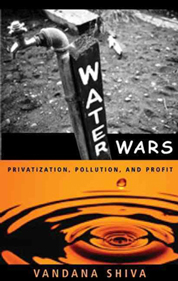
Acclaimed author and award-winning scientist and activist Vandana Shiva lucidly details the severity of the global water shortage, calling the water crisis “the most pervasive, most severe, and most invisible dimension of the ecological devastation of the earth.” She sheds light on the activists who are fighting corporate maneuvers to convert the life-sustaining resource of water into more gold for the elites and uses her knowledge of science and society to outline the emergence of corporate culture and the historical erosion of communal water rights. Using the international water trade and industrial activities such as damming, mining, and aquafarming as her lens, Shiva exposes the destruction of the earth and the disenfranchisement of the world's poor as they are stripped of rights to a precious common good. Revealing how many of the most important conflicts of our time, most often camouflaged as ethnic wars or religious wars, are in fact conflicts over scarce but vital natural resources, she calls for a movement to preserve water access for all and offers a blueprint for global resistance based on examples of successful campaigns. The new edition features a revised introduction by the author and celebrates the spiritual and traditional role water has played in communities throughout history and warns that water privatization threatens cultures and livelihoods worldwide.
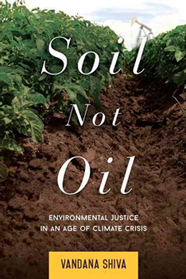
In Soil Not Oil, Vandana Shiva explains that a world beyond dependence on fossil fuels and globalization is both possible and necessary. Condemning industrial agriculture as a recipe for ecological and economic disaster, Shiva champions the small, independent farm: their greater productivity, their greater potential for social justice as they put more resources into the hands of the poor, and the biodiversity that is inherent to the traditional farming practiced in small-scale agriculture. What we need most in a time of changing climates and millions who are hungry, she argues, is sustainable, biologically diverse farms that are more resistant to disease, drought, and flood. “The solution to climate change,” she observes, “and the solution to poverty are the same.” Soil Not Oil proposes a solution based on self-organization, sustainability, and community rather than corporate power and profits.
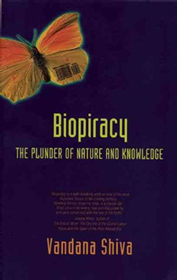
Genetic engineering and the cloning of organisms are “the ultimate expression of the commercialization of science and the commodification of nature.… Life itself is being colonized,” according to renowned environmentalist Vandana Shiva. The resistance to this biopiracy, she argues, is the struggle to conserve both cultural and biological diversity. As the land, forests, oceans, and atmosphere have already been colonized, eroded, and polluted, corporations are now looking for new colonies to exploit and invade for further accumulation—in Shiva’s view, the interior spaces of the bodies of women, plants, and animals. Featuring a new introduction by the author, this edition of Biopiracy is a learned, clear, and passionately stated objection to the ways in which Western businesses are being allowed to expropriate natural processes and traditional forms of knowledge.
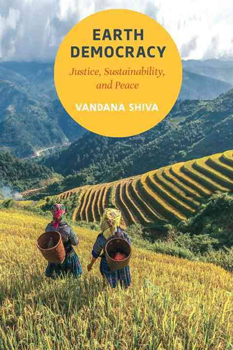
World-renowned environmental activist and physicist Vandana Shiva calls for a radical shift in the values that govern democracies, condemning the role that unrestricted capitalism has played in the destruction of environments and livelihoods. She explores the issues she helped bring to international attention—genetic food engineering, culture theft, and natural resource privatization—uncovering their links to the rising tide of fundamentalism, violence against women, and planetary death. Struggles on the streets of Seattle and Cancun and in homes and farms across the world have yielded a set of principles based on inclusion, nonviolence, reclaiming the commons, and freely sharing the earth’s resources. These ideals, which Dr. Shiva calls “Earth Democracy,” serve as an urgent call to peace and as the basis for a just and sustainable future.
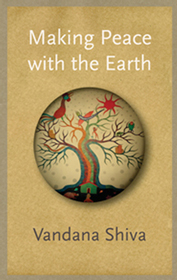
In this compelling and rigorously documented exposition, Vandana Shiva demolishes the myths propagated by corporate globalisation in its pursuit of profit and power and shows its devastating environmental impact. Shiva argues that consumerism lubricates the war against the earth and that corporate control violates all ethical and ecological limits. She takes the reader on a journey through the world's devastated eco-landscape, one of genetic engineering, industrial development and land-grabs in Africa, Asia and South America. She concludes that exploitation of this order is incurring an ecological and economic debt that is unsustainable. Making Peace with the Earth outlines how a paradigm shift to earth-centred politics and economics is our only chance of survival and how collective resistance to corporate exploitation can open the way to a new environmentalism.
Making Peace with the Earth and Ending Our Separation from It.
The Problem with Genetically-Modified Seeds
Solutions to the food and ecological crisis facing us today.
Sydney Peace Prize Talk
Naropa University's Radical Compassion Symposium Presents Vandana Shiva, PhD. "Earth Democracy: Living as Earth Community"
Biopiracy: The Plunder of Nature and Knowledge
“Biopiracy is a path-breaking work on one of the most important issues of the coming century.… Vandana Shiva's inspiring book is a clarion call … (that) should be widely read and discussed by everyone concerned by the fate of the Earth.”
Jeremy Rifkin, author of The Third Industrial Revolution: How Lateral Power Is Transforming Energy, the Economy, and the World and The Zero Marginal Cost Society: The Internet of Things, the Collaborative Commons, and the Eclipse of Capitalism
“With her characteristic blend of analysis and passion, Vandana Shiva traces the continuity from the European colonization of 'native' peoples … to the present appropriation of the natural resources they need for their physical and cultural survival. An important book that should be read by anyone wanting to understand the global threat posed by the technological transformations of organisms, cells, and molecules and by their exploitation and profit.”
Ruth Hubbard, professor emerita of biology, Harvard University
Biopiracy: The Plunder of Nature and Knowledge
“Shiva is a burst of creative energy, an intellectual power.”
The Progressive
“One of the world’s most prominent radical scientists.”
The Guardian
Earth Democracy: Justice, Sustainability, and Peace
“Shiva … has devoted her life to fighting for the rights of the ordinary people of India.… Her fierce intellect and her disarmingly friendly, accessible manner have made her a valuable advocate for people all over the developing world.”
Ms. magazine
“A leading thinker who has eloquently blended her views on the environment, agriculture, spirituality, and women’s rights into a powerful philosophy.”
Utne Reader
Water Wars: Privatization, Pollution, and Profit
“An excellent starting point for anyone who wants to understand the forces driving water scarcity today and threatening its future supply.”
Women’s Review of Books
“A chilling, in-depth examination of the rapidly emerging global crisis.”
In These Times
